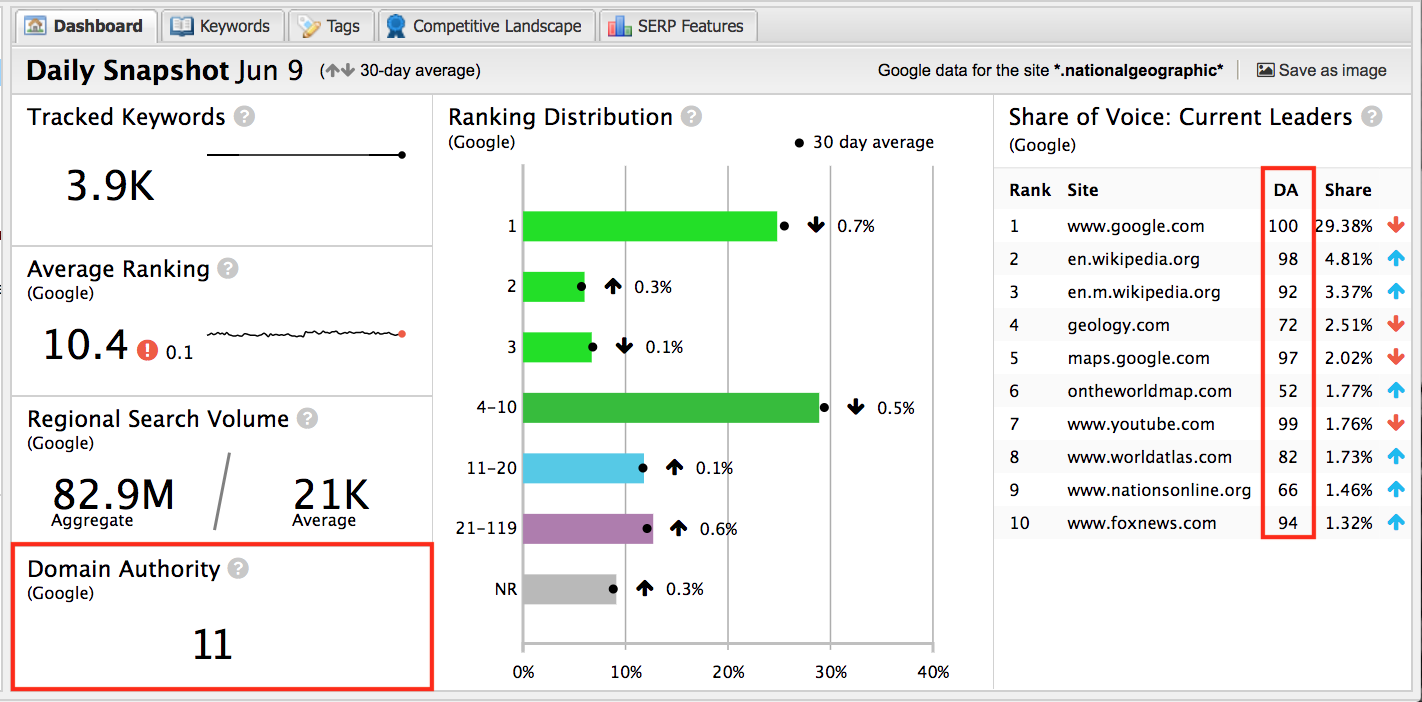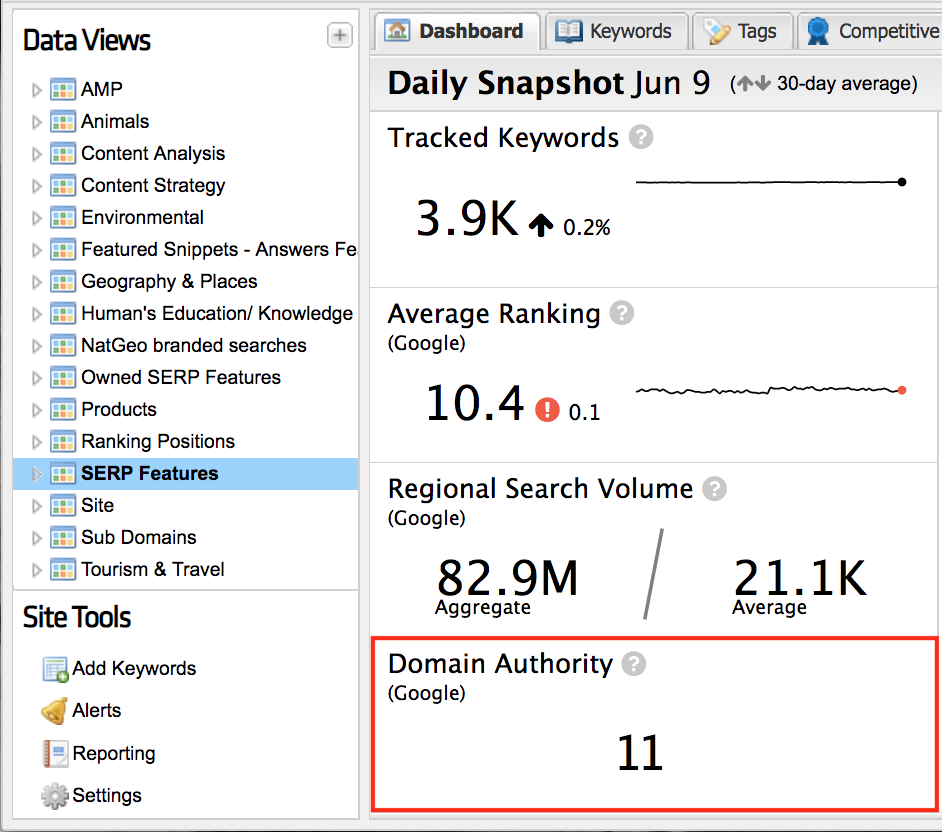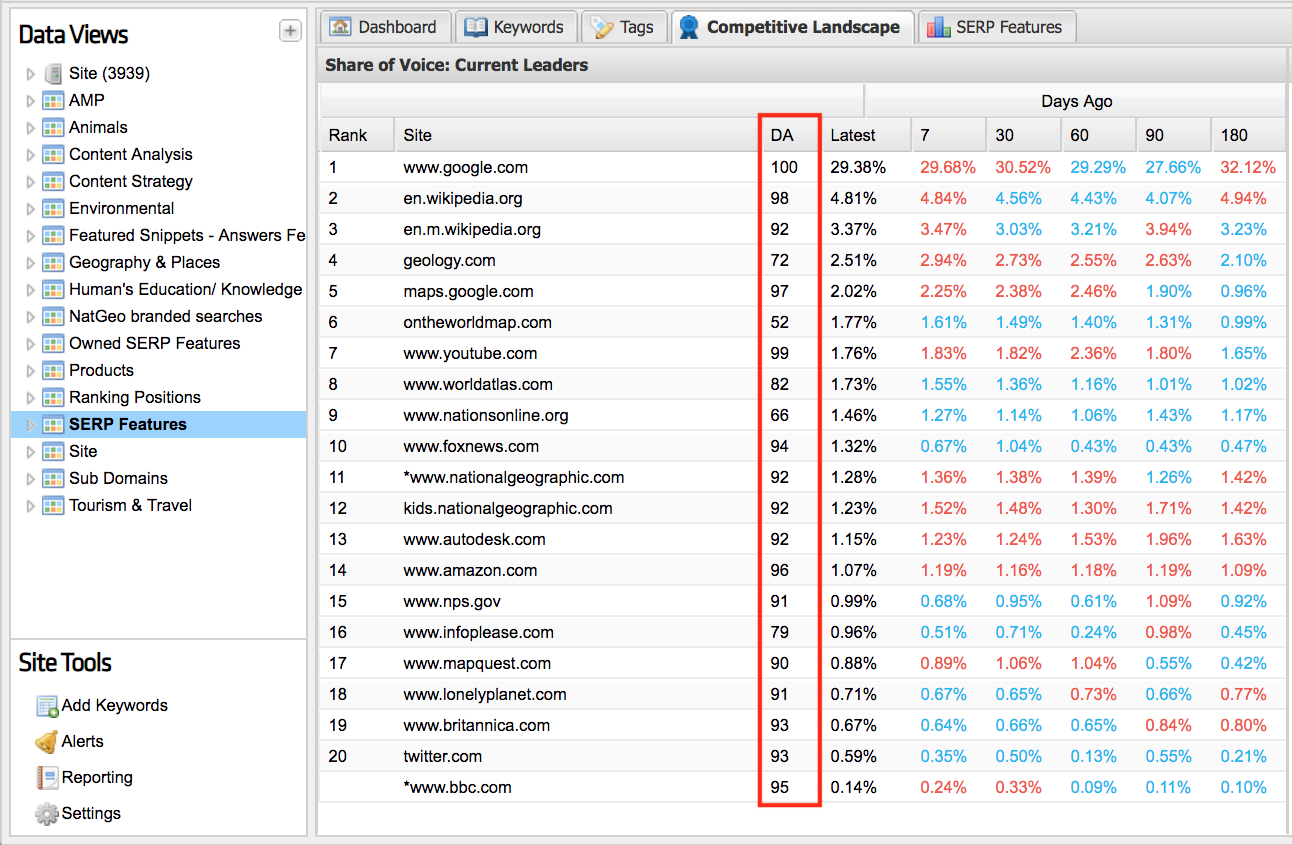For the first time ever, we’re adding site-related metrics to STAT, and we’re starting with the one that helps illuminate how link equity (an all-important ranking factor) influences the SERP — Domain Authority.
Here’s everything you need to know:
What is Domain Authority?
Domain Authority (DA) is a score developed by Moz that reflects a website’s aggregate link equity and is used to help predict how well that site will rank relative to its competitors. DA scores range from one to 100, with higher scores corresponding to a greater ability to rank.
Since Domain Authority reflects the hard work you’ve put into your link-building strategy, it’s an indicator of the success you’re likely to see on the SERPs, not a driver of that success. So, if you’re not sure whether you’re seeing the ranking results that you should, your DA score will help shed some light on the situation.
And, because it needs to be said, Domain Authority is not a metric used by Google — it has no bearing on how search rankings are determined.
How is Domain Authority calculated?
Domain Authority takes multiple calculations into consideration. Roughly speaking, it counts the total number of links that point to a site, evaluates the root domains, detects any link manipulation, factors in Spam Score and a few other proprietary metrics, scales somewhat logarithmically (a DA of 40 is not twice a DA of 20; moving from a 70 to a 75 is significantly harder than moving from a 10 to a 15), and then feeds everything into an advanced machine-learning model, which produces a single DA score. Phew!
Domain Authority is based on attributes surfaced from Moz’s massive (35 trillion-backlinks-big) link index, Link Explorer. And thanks to a 2018 refresh of Link Explorer and a 2019 revamp of the Domain Authority algorithm, DA scores now align more closely with how search engines order their search results.
What is a “good” Domain Authority?
A good Domain Authority score is one that is better than your direct competitors’ scores.
It helps to think of Domain Authority like share of voice. Powerhouse sites like Wikipedia and Google tend to rule the share of voice roost so much so that comparing yourself to them, or attempting to achieve their success, isn’t a worthwhile endeavour. It’s better to measure how your share of voice stacks up against sites in your wheelhouse. In other words, Domain Authority is a comparative tool, so there isn’t necessarily a “good” or “bad” score.
As for how sites tend to fall into the 1–100 scoring system, generally speaking, sites with a large number of high-quality external links (like Wikipedia and Google) are typically at the high end of the spectrum, while small businesses and websites with fewer inbound links tend to sit at the lower end.
Where can I find Domain Authority in STAT?
First, Domain Authority has its very own module in the Daily Snapshot section of the Dashboard tab. This shows your DA score.
Since the metric is calculated at the site level (hence the “domain” part of the name), you’ll see the same score no matter what view you’re looking at — site, data view, or tag. This is meant to help keep the bigger, domain picture top of mind as you drill down into your SERP metrics.
Next, you’ll find Domain Authority in the Share of Voice: Current Leaders board in the Competitive Landscape (and Dashboard) tab. This shows the DA scores of your top SoV competitors and helps add a layer of context as to how those competitors got where they are.
How do I use Domain Authority for SEO?
Like almost every other SEO metric — rankings, traffic, share of voice, etc — Domain Authority shouldn’t be used in isolation but instead as one of the many tools you use to make informed decisions and measure results.
Here are two things Domain Authority can help you do:
Surface your backlink competitors
Thanks to share of voice, you already know exactly who your true SERP competitors are for each of your keyword sets. Now with Domain Authority, you can figure out who might be outstripping you because of a more powerful link profile and who could be making moves due to a different strategy altogether.
Competitors who are beating you in share of voice and have a better Domain Authority are good candidates for a competitive link analysis. Dig into the high-quality links they’re ranking for and begin developing relationships with those sites.
If you see a competitor’s share of voice spike up or down, check to see if their Domain Authority has moved in a similar direction — their new ranking reality might be the result of a backlink shakeup.
Report on link-building progress
If you’re on a link-building spree for yourself or a client and want to show your progress, Domain Authority is one way you can help say, “we built these links for you and now your potential to rank is higher.”
By attracting real, traffic-driving links, you’ll be able to improve your rankings and likely your DA score, too. Want to learn a little more about increasing your Domain Authority? Give this a read.
Where can I get even more link data?
If you’re looking to get your hands on your backlink profile, plus your competitors’ profiles, Link Explorer has you covered. Simply enter the URL of your choosing, create an account, and tuck into the comprehensive backlink analysis before you. If you’re an API user and want to build tools that use link data, then the Mozscape API is right up your alley.
Got DA-related questions? Don’t hesitate to ask — just send them along to clientsuccess@getSTAT.com and we’ll help you out.
Cheers,
The Moz team



